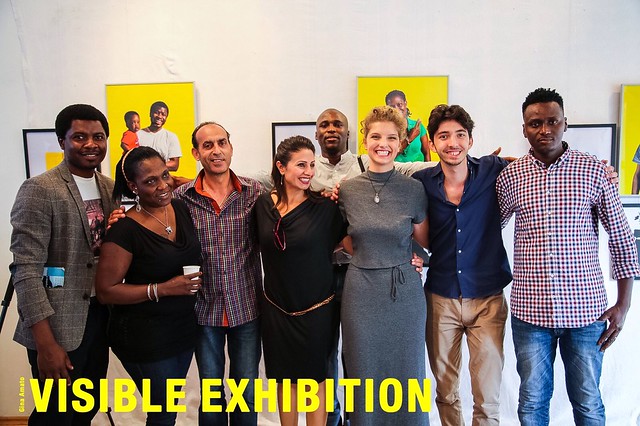|
MAKE THE INVISIBLE - VISIBLE Mach die unsichtbaren sichtbar ! Wer sind die Menschen, die über das gefährliche Mittelmeer flüch- ten müssen, und was bewegt sie dazu ihr Zuhause zu verlassen? Eine Buchvorstellung über tolle Persönlichkeiten die ihre Geschichten erzählen. Gina Amato eine Studentin aus Hamburg wollte mit ihrem Projekt für Aufklärung sorgen. " Für die meisten sind Flüchtlinge Arm. Keiner weiß wer sie wirklich sind. Ich stelle hier tolle Charaktere und ihre Geschichten vor. Sie alle haben viel gesehen und unvorstellbares erlebt. Wir müssen endlich zusammenhalten, denn letztendlich haben wir alle eines gemeinsam : "wir sind alles Menschen!" Für Fragen bezüglich des Projektes oder Anfragen und Anregungen https://soundcloud.com/makethemvisible/sets/vii [email protected] Oder [email protected]
Europe's migrant crisis continues, and it's Germany that has taken in more asylum seekers than any other nation in the region—an estimated 750,000 this year alone.
But as the refugee population grows, attacks on asylum-seekers have also increased. This year there have been more than 170 attacks in Germany. Meanwhile, the European Union has been unable to reach a consensus on how to deal with the sudden influx of refugees. Constanze Stelzenmüller, a Robert Bosch senior fellow with the Center on the United States and Europe at the Brookings Institution, describes Germany's predicament. Though things are difficult, there is hope to be found in one corner of Germany. In the northern city of Hamburg, Larry Macauley hosts an hour long radio program,Refugee Voices, that broadcasts across Germany on the Refugee Radio Network. It's a platform for refugees, made by refugees. Larry was born in Nigeria, and fled Libya after the Arab Spring in 2011. He works with a team of about 20 refugees to make the program that covers politics, culture, and the daily struggles of migrant life.
On a nightly basis, hundreds of migrants in the French port town of Calais are risking their lives attempting to cross the undersea tunnel into the UK. While migrants have long gathered in Calais, Eurotunnel, the firm that runs freight and passenger shuttles via the tunnel, said it’s struggling to cope with numbers that have swelled from 600 to around 5,000 people.
The ongoing crisis has intensified an already sensitive topic in British politics: immigration. Back in May, PM David Cameron was re-elected on a campaign that included a promise to significantly cut annual migration. Under pressure to do something about the Calais migrant crisis, the British leader has begun working to discourage what he described as the “swarm of people” trying to make Britain their new home. Under newly proposed plans, immigrants living in the UK without proper documentation could soon face eviction without a court order. In addition, landlords who fail to check the immigration status of tenants could be fined or imprisoned for up to five years. The move, announced by Communities Secretary Greg Clark, will be included in a new Immigration Bill that will be debated in parliament in the coming months. It also comes on the heels of an $11 million pledge by the British government to improve fencing around the Eurotunnel rail terminal outside Calais. So with PM Cameron warning that the crisis could last all summer, are these recent measures the right approach? We discuss at 19:30 GMT. On this episode of The Stream, we speak with: Don Flynn @donflynnmrn Director of the Migrants’ Rights Network migrantsrights.org.uk Steven Woolfe @Steven_Woolfe Migration spokesman, UKIP stevenwoolfe.uk Jonathan Portes @jdportes Director, National Institute of Economic and Social Research niesr.ac.uk Larry Macaulay @RefugeeRadioNet Founder, Refugee Radio Network refugeeradionetwork.net |
AuteurRefugee Radio Network Archieven
April 2024
Categorieën |

This work is licensed under a Creative Commons Attribution-NonCommercial-ShareAlike 4.0 International License.


 RSS Feed
RSS Feed